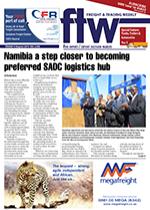Sobering sentiments about sharper security awareness were shared by a member of the Transported Asset Protection Association (Tapa) at a recent conference of the cargo certification and aggregator authority. Referring to return legs of road hauliers, Bridgewater Logistics MD Richard Venter said: “Statistics show that 40% of all freight space on South African roads is empty.” More to the point, and considering he was one of the speakers at a conference on cargo crime, Venter added: “It’s a huge amount of space we’re not using and that is potentially being utilised by other people.” The irony of transport companies following due process, he said, was that they ensured that their assets and the property of their clients were properly loaded and locked and, once the delivery of freight had been completed, the next trip was already top of mind. “However, sometimes our focus is not quite where it should be as operators. Once a load is completed we want our trucks back as quickly as possible so we can reload, send it out and hey, money, money, money. It’s what makes the world go round.” What has become clear through this picture of asset protection and profit maximising, Venter said, was the one important aspect that tended to be overlooked – the driver. “He has to be one of the most important and integral parts of the whole logistics chain. These are often people that we won’t give our cars to so they can go down the road and fill our tanks. Yet we trust them with expensive trucks worth R2-3million and loaded with freight worth millions.” Touching on how important it is to do the necessary security vetting of drivers, Venter said: “We should be training drivers and we should be testing them to see that they are competent. “We should ensure that they are briefed and debriefed. Do they really know how important it is to get where they are going? And when they get back, do they know how important it is to tell the controller what he saw and experienced?” It is through showing real concern for people who perform a primary function in a transport business, by finding out more about the welfare of drivers and their families, that employers can build good faith and perhaps learn about sinister developments that could possibly impact on the successful and safe execution of road haulage. “These people are the eyes and ears of our industry and we should be looking after them as we are looking after our assets and our clients’ cargo.” Recalling a certain incident where a return leg was exploited by smugglers because a controller allowed a driver to make an unscheduled stop to help a relative in need, Venter spoke of how the company in question found its truck subsequently impounded and the driver arrested after a 12-metre-long load of marijuana was found in the back of the truck. “We need to look at socio-economic factors. This country’s economic cycle has probably been at the lowest point it has been in the country’s history and drivers are soft targets. They are not big earners and syndicates are exploiting it. Drivers are approached by illegal utilisers to fill empty leg capacity at less than a quarter of the price. As operators, we have to find a way around and figure out how to avert it.” Tapa executive Thorsten Neumann also told conference attendees that, according to its data, 70% of all cargo crime on South Africa’s roads was committed by using inside information. It is therefore felt that, by bringing the industry in line with the association’s Trucking Security Requirements certification and its risk-prevention measures, such as secure route planning, cargo crime on the country’s roads could be significantly curbed.
INSERT
These people are the eyes and ears of our industry and we should be looking after them. – Richard Venter

